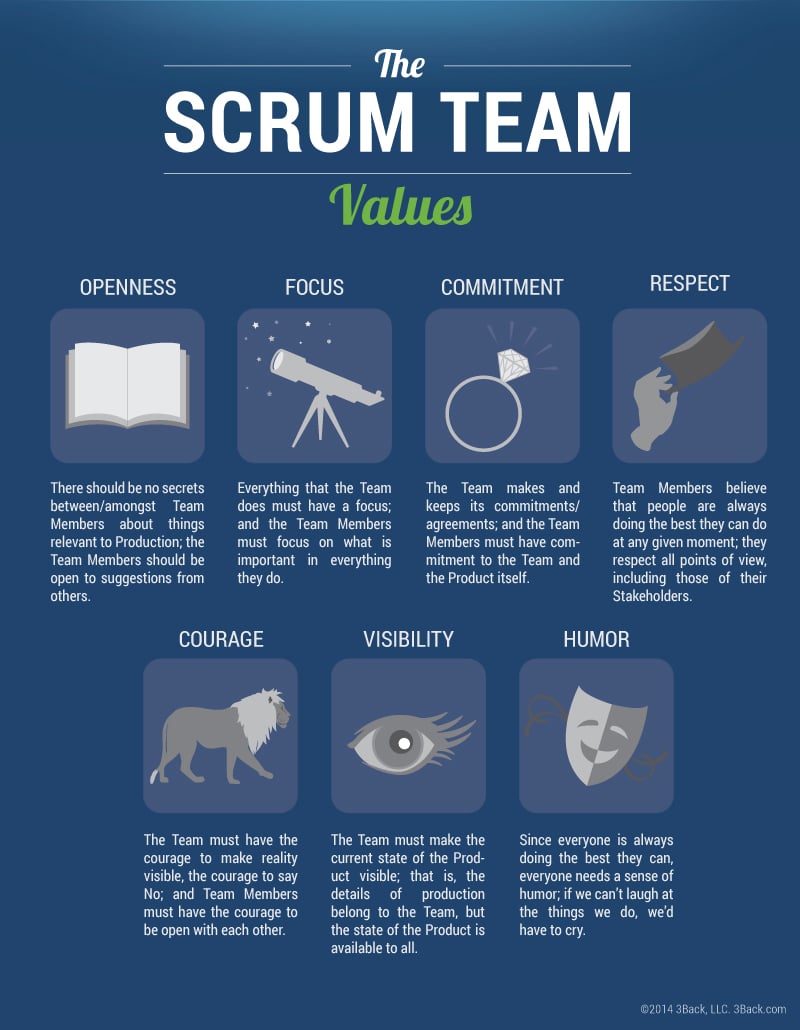Scrum is successful largely because it is based on values. The collection of Team Values listed here are ones I want Scrum Teams to have, and it would be nice if the Team Members have them (as individuals), as well. It would be even nicer if the people surrounding the team (and the Organization as a whole) had them, but that’s often too much to hope for. The Black Book(1) described the first five of these Values, and called them the Scrum Values. Based on my experiences with Scrum, I have added two more Values to the list. Collectively, I call these Values the Team Values.
I believe that these Values are tightly coupled to one another; there is significant overlap between/among the Values. For that reason, it is not my intention to describe exactly what these Values mean; the way each Team interprets these Values is its own. In any case, below is an infographic of the Values and some of my comments about them. It is my intention that you reflect on these Values taking my comments into account in order to help you make yourself, your Team, and your Organization, better.
Openness
- There should be no secrets between/amongst Team Members about things relevant to Production; the Team Members should be open to suggestions from others.
Focus
- Everything that the Team does must have a focus; and the Team Members must focus on what is important in everything they do.
Commitment
- The Team makes and keeps its commitments/ agreements; and the Team Members must have commitment to the Team and the Product itself.
Respect
- Team Members believe that people are always doing the best they can do at any given moment; they respect all points of view, including those of their Stakeholders.
Courage
- The Team must have the courage to make reality visible, the courage to say No; and Team Members must have the courage to be open with each other.
Visibility
- The Team must make the current state of the Product visible; that is, the details of production belong to the Team, but the state of the Product is available to all.
Humor
- Since everyone is always doing the best they can, everyone needs a sense of humor; if we can’t laugh at the things we do, we’d have to cry.
In particular, Respect is an interesting value. Since Respect means that each of us believes that people are always doing the best they can, and since a person’s behavior is a function of the person and the environment,(2) this says that in order to change a person’s behavior, the person’s environment must change. The environment can be changed in many ways, including modifying practices, providing training, emphasizing the Team Values, removing impediments… whatever it takes. The focus should be on fixing the environment – not on fixing the people – when trying to change behavior.
[contextly_sidebar id=”eOyykIgSPpZ0t2cWyuNdCasg1gQAKQV1″]
Keep in mind that these Values exist because teams that have them are usually good teams, and thinking about them will help teams improve. I believe that a Team’s actual values can only be determined by looking at what it actually does. Therefore, I believe that discussion of the Values should be an integral part of every Team Retrospective and Intraspective.
These are not the only values the Team should pay attention to. The Organization itself has values, and the Team should understand them as well. Often, when an Organization is new to Scrum, the Organization’s values will be in conflict with the Team Values I have listed here. In particular, the Organization may not value ‘safety’ and thus not provide a safe environment for the Team, which will make it very hard for the Team to live the Team Values I just discussed. I firmly believe that safety for the Team must be present (to some minimal degree, at least) in order for a Team to be capable of living the Team Values.
When the Team’s and Organization’s values clash, it is the ScrumMaster’s job to have discussions with the Team and the Organization, in order to resolve these differences and/or help the Team decide what to do. In other words, the ScrumMaster should help the Team resolve its differences with the Organization. In many cases, these differences in values are the primary impediment to becoming scrummish, and hence effective as a Team.
References:
(1) Ken Schwaber and Mike Beedle, Agile Software Development with Scrum, Prentice-Hall, 2002. Pages 147-154.
(2) Lewin’s Equation, developed by Kurt Lewin, the founder of social psychology.


